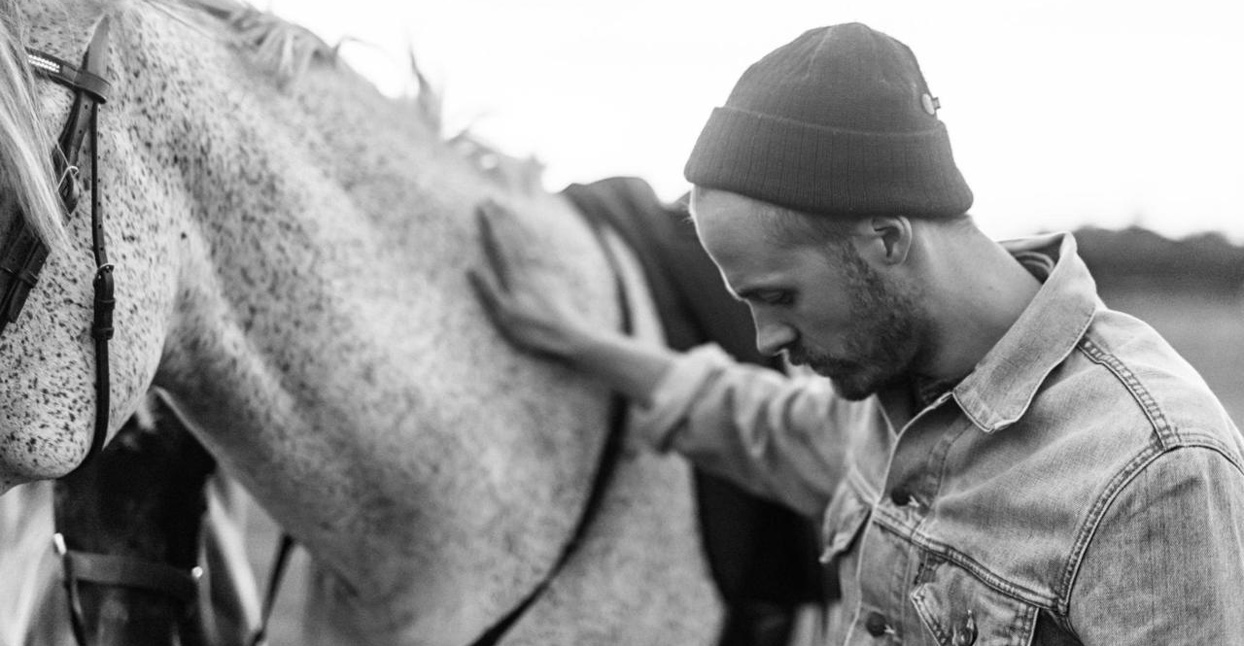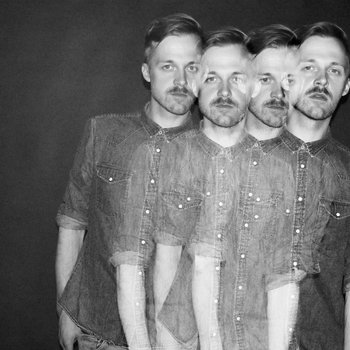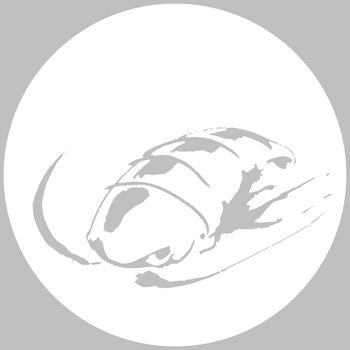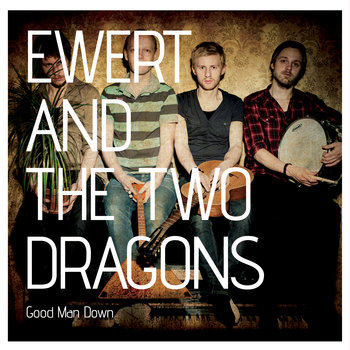
There aren’t many “big” Estonian bands. A nation of just over one million people with limited large cities can’t sustain many full-time musicians. (On the flip side, in a culture heavy on traditional folk music, it can often seem like everyone in the country has some kind of musical skill.) That makes Ewert and the Two Dragons’ success both at home and abroad all the more exciting.
Two Dragons guitarist Erki Pärnoja is piggybacking on the band’s international reach with a new solo project, though he has no plans to turn his back on the folk-rock outfit. After two albums, multiple international tours, and even a 2013 European Border Breakers award, he’s entirely wrapped up in Ewert and the Two Dragons. But thanks to a game of “what if,” Pärnoja found himself craving a bit more than band life. With Efterglow, his full-length solo debut, Pärnoja got his answers. It started with him wondering what would happen if he worked alone and embraced the Beatles and Rolling Stones—the two guitar heroes from his youth. It ended with one of his tracks scoring a mini-documentary about the life of his grandmother. In the clip, scored by the album’s title track, his grandmother returns to the ruins of the textile factory where she for the majority of her life. Like Pärnoja’s music, it’s both largely left open for viewer interpretation. It’s also deeply moving.


Since the Estonian language isn’t commonly heard outside of Estonia, what’s a common phrase or saying I should know?
When I speak to my band members we speak in English. We have Estonians, one Dane, and a Swede in the group. Sometimes, just to make my point clear, I use Estonian idioms and roughly translate them. They make no sense to people. Like, ‘I don’t want to cluck before I lay my egg.’ They sound so rough when you translate them.








Compact Disc (CD), Vinyl LP




After having some success with Ewert and the Two Dragons, what made you decide to put out a solo album?
My biggest musical heroes are singer/songwriters. It’s just an organic flow. A band in one being. But I’m not gifted as a vocalist—I’m a decent background singer but not the singer—so it’s been haunting me. It’s brilliant playing in bands, and I love to do that. But I discovered, in my 30s, that I love working on the music on my own. Up until a few years ago, I’ve been a proper ‘band man.’ A team player. I’ve always done that, taking the lead when it’s necessary and giving in when it’s necessary.
With the Dragons, it became really active and I started noticing that there’s something missing for me. I wanted to get the experience of responsibility. I don’t have three or four guys to share responsivity with and share ideas with. I just wanted to see how it is to have the name on my passport come out with music. Which means this is me, and this is only me. I just wanted to take the credit, the hits and critique, and see how I manage.


Did you immediately feel comfortable taking on a leadership role?
I think my band members have been teaching me how to be a better leader. Even though the band is playing my recorded music, I just send them the tracks and they play it. I don’t want to tell anybody how to do something differently. They can tell me, ‘Hey dude, this doesn’t work live so well.’ Then I think about that and consider it. It’s the excitement or thrill of having that experience of being responsible for stuff. I think I’m getting used to it after a year and a half. The first album I came out with, the EP Himmelbjerget, I did it out of the need to test writing, recording, and producing on my own. Most of the stuff I recorded in my sauna or behind my kitchen table.
‘In my sauna.’ That might be the most Baltic statement I’ve ever heard.
Yes! That’s proper Nordic stuff. It’s a wooden little booth. But yeah, that was the plan, I just wanted to record how it is and how it feels to do that. I wanted to experience the process. My friends were the ones who told me, ‘Dude, this is a record. You’ve put so much work into it, release it.’
That’s how it started. I didn’t have a plan as to if I should play live or not. But there’s another Estonian idiom, ‘Your appetite grows the more you eat.’ That’s what happened to me. I recorded it and it felt like I wanted something more. Then I decided to play live. And so it goes.
I think what you’re describing is a very good leader. In any context, shouldn’t a leader be good with a flexible plan, one that takes other people into account?
Totally. That’s what I believe in. I think it is possible. There are examples. Maybe not musical, but if you look at communities or small organizations, the leaders don’t have to be assholes. Another Estonian saying, ‘Good kids grow up without a branch’—the things that you spank kids with. Good kids grow up without that. It doesn’t take harsh leadership to have your people follow you. That’s what I believe in.

How did the short film for Efterglow come together?
When I came out with my first record, the first comments I got from people who tried to describe my music, or the emotions, said it was a soundtrack. They immediately get pictures in their head, or draw parallels from emotional experiences in their lives. So the idea that my music sounded ‘cinematographic’ was put on it from the very start. I started noticing it myself, and the idea settled into me. It wasn’t my intention from the start, and it isn’t still. But ever since I’ve had the idea that I should maybe connect my music to film or to another art form.
So, last summer when I got the title song ready, “Efterglow,” I realized that the name and the emotion the song carries ties everything up, and that the song needed to have a video. ‘Efterglow’ means afterglow, but it’s what we call in my band ‘Swinglish’—which is part Swedish, part English. It’s like an inside joke that we have. We speak a mixed language. But then I thought, ‘I need a video.’ I visualized the Estonian gray, bleak landscape that is pretty sad. I instantly saw that in my head. And then I saw a really old man. My idea was to film just the old man’s eyes. Just getting the story out of his eyes and not giving a straight narrative. Look at the eyes of the man who had lead a long life, and see the stories behind those eyes. What’s happening there?
That was my plan. I asked a friend who works in the theatre for advice as to who I should contact, and he said, ‘Ingel Vaikla. Contact her.’ I did. I didn’t know her, but I wrote her right after midnight the same night, because I didn’t want to lose any time. I saw her last documentary, and I was really inspired by the language. It was really cool and Scandinavian. It leaves a lot of space to think your own thoughts. The visual language is so quiet. I felt really inspired. We got together after a few days, but she said it was not a challenge she wanted to take up.
So I said, ‘Let’s do it the way you want to. Let’s set it free.’ It’s the same principal I use in my band. I have an idea, but you can give me your perspective and do it your own way.
See, good leader!
Ha! That’s the way it went. She gave it some thought and got back to me and said she wanted to do a documentary. She wanted to do a short film. That ties it all up again. If they call my music a soundtrack, there you have it. Now it’s a soundtrack for a film that’s made for my music. It’s a bit backwards. It just wanted to also be surprised. I didn’t want to be part of the process, because I wanted her to make her own film. I just wanted to see it when it was ready. So I didn’t go on the set.
I was super surprised by the outcome. It was based on trust and agreement. I knew she was going to make her own film. And she was going to do her best because it’s going to be her thing, with her name under it. I was really happy with the idea we came up with, and the result: A documentary about my grandmother. One of the outcomes of this process is that my relationship with my grandmother has changed in a really good way. I’m a grownup, I’m a father of two kids. But you still see your grandmother as your grandmother. That’s the way it goes. But now, we were part of the same project. It’s really weird, but it’s so cool. She called me with some ideas, and she described what pictures she got in her head about my music. Maybe she heard something and said it sounded like the sea side, or a swamp at the break of dawn. It was like, ‘Wow—this is fantastic.’ She saw that listening to my music. So we have a totally different, grownup relationship. I could have never imagined this happening—that I would seriously discuss art matters with my grandmother. It was really cool.
What did your grandmother think of the experience?
I think since she’s not connected the internet, she hasn’t gotten any feedback yet. I sent some links to my mother so that my mother can read those comments from the press and video, so my grandmother can get that feedback. She saw the film at the release and she liked it, but she still doesn’t know what people think. She’s not an actor. She got benefits out of it also, because she was really dealing with that stuff in the film. She actually hasn’t been back to the factory. I knew that she worked at the factory but I didn’t know she worked there for 40 years. I’m in the beginning of my 30s. She’s worked and lived her life there for longer than I’ve been on this planet.
She met her husband there. She was doing music. She was singing in ensembles and bands. Those were also tied to the factory. It had to do with the Soviet Union—everything was made so that the people would want to go to work. Everything was connected to that. Most of the town was built around that factory. The idea of it. It’s quite a trip, the whole thing.
Music seems to run in your family.
I think so. I’m the first sort of professional. I do it for a living. They’ve always had it as a bit of a hobby, but a very active hobby. My grandmother was singing in bands and she met her husband, who was a trombonist in the band. My mother has always sung in choirs. She studied to be a kindergarten music teacher. My uncle happened to be a big rock star in the ’90s. He’s still well known and playing with his band, but they’re not as active as they were in the ’90s. So music has always been around since I was a tiny guy. I just wanted to crawl up the cupboard to reach my grandfather’s trombone from the upper shelf. I was just waiting; I was going to grow up, I was going to get there. And I did—the trombone was one of the first instruments I learned to play. I had music around all the time. Music was a common language at home.
Do you have a specific first musical memory?
It must have been the moment of realization that I thought, ‘I want to know how to do this.’ It was connected to the Beatles, I’m pretty sure. Maybe “While My Guitar Gently Weeps.” I might be wrong—it might have been late Beatles. I just remember The Beatles being this trigger for me. Everyone was listening to hip-hop and dance music at school, and I was the weird guy wearing a turtleneck, and wide ‘70s jeans with a boot cut. I was a weird one, but I didn’t really care. I covered all my school materials with The Beatles. I read books and biographies, anything I could get my hands on. Usually they were German books, because there wasn’t too much published in Estonian.
I also sang in a choir and traveled a bit, so I brought back more books from Germany and Sweden. After some years, I opened the door for Rolling Stones, and I decided they were okay too. That was the biggest thing for me. Just when I started discovering the Stones, they came over here on the Bridges to Babylon tour. I was 14, and I saw them in a big stadium concert in the first row at Keith’s side. Look at me now, I’m a grownup man and I still usually play with a maple Telecaster. I still haven’t gotten over it.
When you die and go to rock n roll heaven, who would be in your band?
Thom Yorke. If I get to jam with anyone, it would be him. He would be the singer, guitarist, and keyboardist. I’m going to need a drummer, so Ringo Starr. Just for the crack of it. Ringo, Thom, and me in one band. I’m going to go with this trio. I’ll hold open auditions for the bass player. Apparently, I’m a good leader—I won’t tell you what to do!
—Laura Studarus







